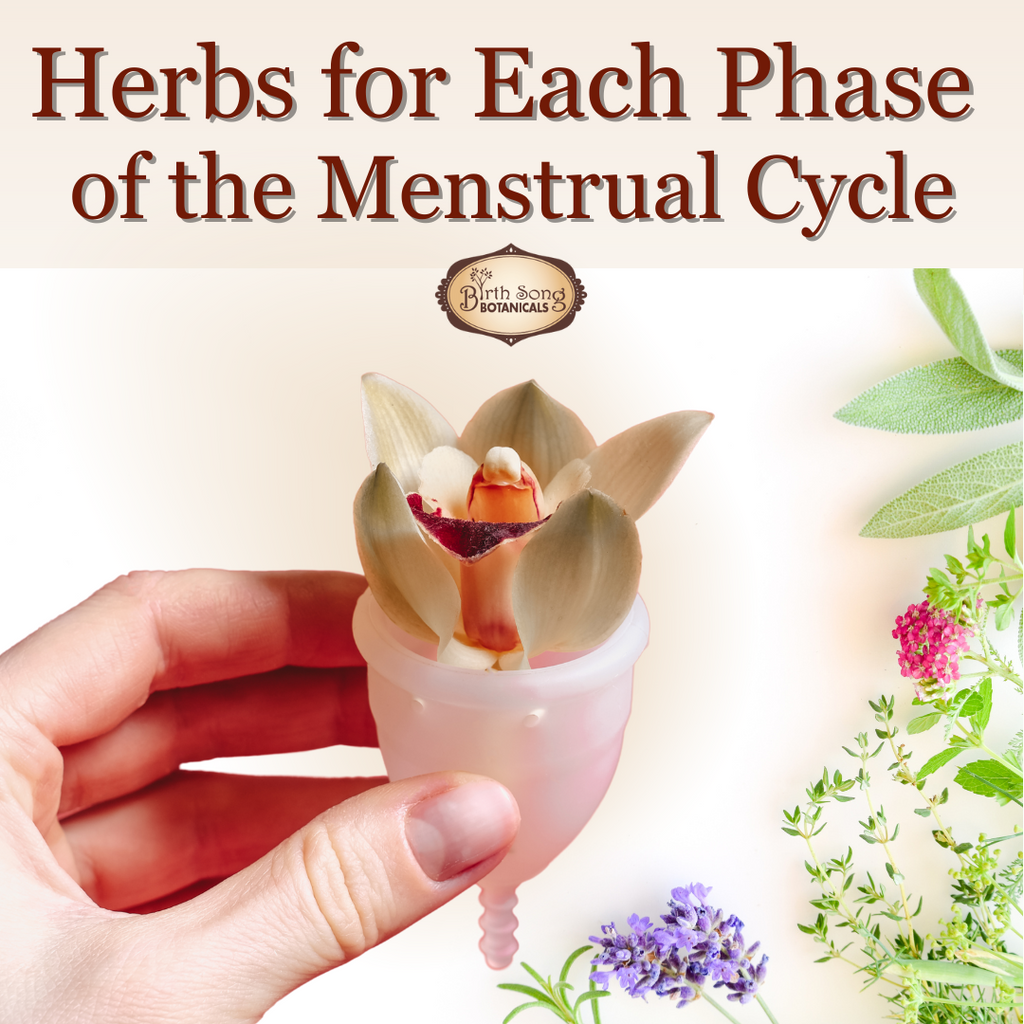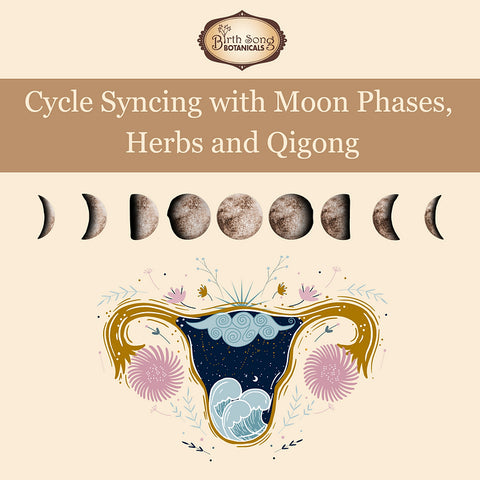Herbs for Each Phase of the Menstrual Cycle

The menstrual cycle is a beautifully intricate process that reflects the body's natural rhythms. It consists of four distinct phases, each requiring different types of nourishment and support. Understanding these phases and working with herbal allies can help create balance, ease discomfort, and optimize overall well-being.
In this post, we explore distinct herbs for each phase of the menstrual cycle. Read more to better understand each phase and to connect even more deeply with your natural feminine rhythms.
Understanding the Menstrual Cycle
- Menstrual Phase (Days 1-5): This is the shedding phase when the uterine lining is released. It’s a time for rest, renewal, and reflection.
- Follicular Phase (Days 6-14): Hormones start to rise, signaling the body to prepare for ovulation. This phase is marked by increased energy, creativity, and motivation.
- Ovulatory Phase (Days 15-17): Estrogen peaks, triggering the release of an egg. This is a time of high energy, confidence, and social connection.
- Luteal Phase (Days 18-28): Progesterone levels rise, preparing the body for a potential pregnancy. If no implantation occurs, hormone levels drop, leading to menstruation.
Phase 1: Menstrual Phase
Menstruation marks the beginning of a cycle and is the easiest phase to recognize. The uterine lining begins to shed, resulting in bleeding. This is a result of decreased levels of estrogen and progesterone. Estrogen will steadily increase over the course of the menstrual and follicular phases, but progesterone will stay at a consistently low level until ovulation, at which time you’ll steadily feel energy levels increasing.
The menstrual phase is a time of release and renewal. The body sheds the uterine lining, which requires energy and internal resources. This is a time to prioritize rest, warmth, and gentle nourishment.
Supportive Herbs for Menstruation
- Raspberry Leaf (Rubus idaeus): A uterine tonic that helps regulate menstrual flow and alleviate cramping.
- Nettle (Urtica dioica): Provides essential nutrients to replenish the body and support blood production.
- Cramp Bark (Viburnum opulus): Specifically helpful for relieving uterine cramps and muscle tension.
- Mugwort (Artemisia vulgaris): Traditionally used to support menstrual flow and ease stagnation.

Phase 2: Follicular Phase
This is the phase in which our bodies prepare for a potential pregnancy. It’s an opportunity for a new beginning, and we often feel heightened energy and vitality in our bodies. There’s a steady increase of follicle stimulating hormone (FSH) as well as increased estrogen, which causes luteinizing hormone (LH) levels to go up dramatically and several follicles to develop. These follicles hold immature eggs until at least one is released during ovulation. We want to support the potential for increased vitality during this time.
The follicular phase is a time of renewal, growth, and expansion. Estrogen levels begin to rise, encouraging the maturation of eggs in the ovaries and the thickening of the uterine lining. During this phase, the body craves nutrient-dense herbs that nourish, energize, and build vitality.

As we feel our energy levels increasing, we should notice PMS symptoms decreasing and a generally more pleasant sense of being. We are more extroverted, social, and confident during this phase. This reflects our animalistic instinct of attempting to attract a mate in preparation for ovulation and conception. Even if you’re not trying to get pregnant at this time, it’s a good idea to support this phase to ensure overall health and bodily balance.
Supportive Herbs for the Follicular Phase
- Nettle (Urtica dioica): Rich in iron, calcium, and magnesium to support energy and hormonal balance.
- Tulsi (Ocimum sanctum): Helps regulate cortisol levels and provides mental clarity.
- Schisandra (Schisandra chinensis): Supports liver detoxification and enhances endurance and focus.
Phase 3: Ovulatory Phase
Ovulation is the peak of the menstrual cycle, a time of heightened energy, fertility, and confidence. Supporting the body with nourishing, hormone-balancing herbs can enhance overall well-being during this phase.
Ovulation occurs halfway through the average cycle and begins with the release of at least one mature egg. It’s a 1-2 day window when we are most fertile and when we experience a peak in estrogen, LH, and LSF. This is usually when we are feeling at our peak. Energy levels are up, our skin looks vibrant and clear, and we have an extrospective presence. We are usually at our sexual peak as well.
Supportive Herbs for Ovulation
- Red Clover (Trifolium pratense): Rich in phytoestrogens, Red Clover helps balance hormones and supports reproductive health.
- Shatavari (Asparagus racemosus): A deeply nourishing adaptogen that enhances fertility, supports estrogen balance, and promotes hydration of the reproductive tissues.
- Maca (Lepidium meyenii): A powerful adaptogen that supports libido, energy levels, and hormonal balance.

Phase 4: Luteal Phase
This phase begins right after ovulation. It is marked by the breaking down of an unfertilized egg, decreased levels of estrogen, and a spike in progesterone levels. This abrupt change in hormones is what can lead to intense, unpleasant, or unmanageable feelings and symptoms. This is generally a time when we begin to look within. Our energy decreases, and we may become more withdrawn and introverted.
As the body transitions from ovulation to the luteal phase, hormone levels shift, and the body requires different forms of support. The luteal phase often brings symptoms such as bloating, mood changes, and fatigue. Herbs that promote relaxation, hormone balance, and stress management can be incredibly beneficial.
Supportive Herbs for the Luteal Phase
- Chaste Tree (Vitex agnus-castus): Supports progesterone production and helps alleviate PMS symptoms such as mood swings and breast tenderness.
- Ginger (Zingiber officinale): A warming herb that aids digestion, reduces inflammation, and helps with bloating and menstrual cramps.
- Burdock (Arctium lappa): Supports liver function, aiding in hormone detoxification and reducing skin breakouts associated with hormonal fluctuations.
- Ashwagandha (Withania somnifera): An adaptogen that nourishes the nervous system, reduces anxiety and supports restful sleep during the luteal phase.
The Benefits of Liver Support for a Healthy Menstrual Cycle
A well-functioning liver is crucial for hormone balance and detoxification. Supporting the liver helps regulate estrogen levels and reduces symptoms like bloating acne, and mood swings.
Liver-Supporting Herbs
- Dandelion Root (Taraxacum officinale): Enhances liver detoxification and supports digestion.
- Burdock Root (Arctium lappa): Aids in hormone metabolism and reduces excess estrogen.
- Milk Thistle (Silybum marianum): Protects liver cells and promotes regeneration.
- Chicory Root (Cichorium intybus): Supports bile production for optimal digestion and detoxification.
- Yellow Dock (Rumex crispus): Rich in iron, supports blood health and aids liver function.
- Liquid Chlorophyll: Supports liver function by increasing detoxification enzymes and reducing inflammation. It may also help protect the liver from damage caused by toxins.
The Importance of Fiber for Cleansing
Dietary fiber plays a crucial role in eliminating excess hormones and toxins from the body. Consuming fiber-rich foods such as flaxseeds, chia seeds, leafy greens, and whole grains can promote a healthy menstrual cycle by supporting digestion and detoxification. In our seed cycling blog, you can learn more about working with seeds to balance hormones.

Yoni Steaming for Healthy Menstrual Flow
Yoni steaming is a traditional practice used to promote warmth and circulation in the pelvic area, encouraging a balanced menstrual flow.
Beneficial Yoni Steaming Herbs
- Lavender
- White Sage
- Nettle
- Rose
- Red Raspberry Leaf
- Chamomile
- Dandelion
- Calendula
- Mugwort
Important Note about steaming: Do not steam if you are pregnant, during your period, after ovulation, if you are trying to get pregnant, or if there is excess heat in the body due to fever, hot flashes, or night sweats.

By aligning with the natural rhythms of the menstrual cycle and incorporating these herbal allies, we can foster balance, vitality, and overall well-being.
In this post, we focused on herbs for each of the menstrual phases, and if you'd like to take it a step further and sync your menstrual cycle with the lunar cycles, you'll love:
I sincerely hope this post supports and inspires you to connect even more deeply with your womb and take care of your menstrual cycle. Working with the plants to nourish our natural rhythms.
Maria
🌿🩸🌿
Disclaimer:
If you are having serious issues with your menstrual cycle, consult a trusted healthcare practitioner. This post is written in the spirit of education and inspiration. It is not intended to treat, diagnose, or cure any disease or illness.
Want More?!? Check these out!
Herbal Products for PMS:
Blog Posts:
- 7 Common Causes of Period Spotting
- How to Enjoy Your Period
- Four Ways to Increase Fertility Naturally
- Herbal Remedies for Heavy Period Bleeding in Perimenopause
- When Will My Menstrual Cycle Return After Having a Baby
- What You Should Know About PCOS
- Tracking Your Cycle: With The Fertility Awareness Method
- How to Plan or Prevent Pregnancy
- Menstrual Cycle Syncing with Moon Phases, Herbs and Qigong
- Harnessing the Power of Mugwort and the Moon
- Balancing Hormones with Seed Cycling
- The Incredible Benefits of Shatavari for Women’s Health
- Yoni Steam- The Sacred Origin, The Herbs, and How To Steam
- Womb Food: Eat These Four Foods To Improve Your Uterine Health
- Natural Remedies for Bacterial Vaginosis BV
- Black Cohosh for Hot Flashes in Menopause
- Natural Ways to Boost Testosterone In Women During Perimenopause and Menopause
- Botanica Erotica: Exploring Sensuality and Aphrodisiac Herbs
- Treating a Urinary or Bladder Infection Naturally: An Informative Guide
- A Woman's Guide to Uterine Fibroids
- Herbs for Hot Flashes in Menopause
- St. John's Wort: For First Aid, Nerve Pain, and Mood Support
- You Don't Want a Cold Womb This Winter!
Remember to:
Like our Birth Song Botanicals Facebook Page
Follow Birth Song Botanicals Co. on Instagram
Read our Birth Song Botanicals Blog
Watch Birth Song Botanicals on Youtube
Listen to Birth Song Botanicals on SoundCloud
Be inspired by Birth Song Botanicals on Pinterest








